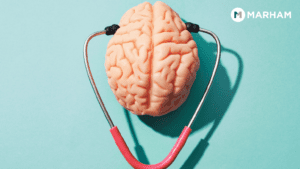Fish oil is an incredible source of omega 3 fatty acids. Omega 3 fatty acids are linked to many potential health benefits. More specifically, they boost heart and brain health, provide protection against chronic illnesses, and reduce inflammation in the body.
Highlights:
- Omega 3 fatty acids have many potential benefits for the overall health.
- It not only benefits physical health but also improves mental health.
- Eicosapentaenoic acid (EPA) is the most beneficial for reducing the symptoms of depression.
- It can improve the brain and heart health and can reduce the risk of many mental diseases.
Omega 3 fatty acids are extremely essential and are commonly found in fish oil. They are very important for the health of the brain and body.
It is one of the few ingredients that have been studied thoroughly.
If you don’t like eating fish, you can reap the benefits of omega 3 fatty acids by taking omega 3 fish oil capsules or omega 3 supplements.
You can also consult with the best nutritionist in Pakistan via Marham.pk.
9 Science-Based Benefits of Omega 3 Fatty Acids
1. Fights Anxiety and Depression
Depression, anxiety, and tension are the most prevalent mental disorders around the globe. Some common signs and symptoms of depression are lethargy, loss of interest in life, and unexplained sadness.
On the other hand, anxiety is also a commonly known mental disorder that is characterized by restlessness, feelings of panic, and fear.
Eventfully, many studies indicate that people who take omega 3 fatty acids are less likely to have any symptoms of depression and anxiety.


Moreover, a study conducted in 2018 suggested that omega 3 supplements or fish oil supplements may improve the symptoms of anxiety and depression.
There are three types of omega 3 fatty acids: alpha-linolenic acid (ALA), eicosapentaenoic acid (EPA), and docosahexaenoic acid (DHA). Out of these, eicosapentaenoic acid (EPA) is the most beneficial for reducing the symptoms of depression.
2. Eye Health
Docosahexaenoic acid (DHA) is a type of omega 3 that is also the major structural component of the retina in the eye. Therefore, if you don’t get sufficient DHA, you may get vision problems.
A study conducted in 2018 showed that people who don’t take enough omega 3 are more prone to get eye disease except dry eye disease.


Moreover, the health of the eyes starts to deteriorate in old age which can cause macular degeneration (AMD). Macular degeneration (AMD) is one of the leading causes of permanent eye blindness and eye damage around the world.
Eating fish can reduce the risk of Macular degeneration (AMD). It is better to eat fish than to take fish oil supplements to avoid macular degeneration.
3. Improve and Promote Brain Health
If you measure the brain’s weight without any fluid, it will have approximately 20% polyunsaturated fatty acids which include Omega-3. This shows how much omega 3 is important for the functioning of the brain.
Omega 3 fatty acid is not only important for brain development and growth in adults but also in infants.
Research conducted in 2020 suggested that people with mental health conditions have lower omega-3 levels. High omega-3 levels in the blood can prevent the onset of mental conditions. They not only prevent but also improve the symptoms of mental health conditions such as depression.


Taking sufficient omega 3 fatty acids during pregnancy is also linked with many benefits for your baby. Some of the benefits are as follows:
- Improved Cognitive Development
- Better Communication and Social Skills
- Reduced Risk of Developmental Delay
- Less Behavioral Problems
- Healthy Brain Development and Growth
4. Reduce the Risk of Heart Diseases
Omega 3 fatty acids are also known for their potential to maintain heart health and provide protection against heart diseases.
Research conducted in 2020 showed that people who eat a lot of fish have a lesser risk of developing any heart disease. And this is associated with the consumption of omega 3.
In some people, consumption of omega 3 can lower the LDL/ bad cholesterol levels. However, the evidence is varied, as some studies suggest that LDL cholesterol levels increase with the consumption of omega 3.


Some of the benefits of the consumption of omega 3 are as follows:
- Raise HDL Cholesterol Levels
- Reduce Triglycerides Levels
- Reduce Blood Pressure
- Reduce Inflammation
- Prevent Blood Clotting
5. Reduce Inflammation
Inflammation is a necessary response to damage and infections in the body. It is vital for the body but in some cases, the inflammation persists for longer periods without any injury or infection. This is known as chronic inflammation. Long-term inflammation or chronic inflammation can cause chronic diseases such as cancer, heart disease, etc.
Fish oil has anti-inflammatory properties and helps in treating chronic inflammation. Fish oil supplements or omega 3 capsules can reduce the stiffness and pain in joints.


In particular, omega 3s can lessen the production of substances and molecules related to inflammation such as inflammatory cytokines and eicosanoids.
Moreover, many studies have seen a relationship between omega 3 supplements and reduced inflammation.
A study conducted in 2022 suggests that omega 3 supplementation can decrease C-reactive protein (CRP) and other inflammatory markers in adults.
6. Aids in Treating Autoimmune Diseases
Autoimmune diseases are the ones in which the immune system of a body mistakes healthy cells for foreign entities and starts attacking them.
One of the most common examples of autoimmune disease is Type 1 diabetes in which the immune system attacks the insulin-producing cells in the pancreas.
Omega 3s in fish oil supplements and fish can help in treating diseases such as rheumatoid arthritis, Crohn’s disease, lupus, ulcerative colitis, psoriasis, etc.


As per a study conducted in 2017, increased intake of fatty acids (DHA) during infancy is linked to a lower risk of type 1 diabetes later in life.
However, we need more research to understand the working of omega 3s for autoimmune diseases.
7. Reduce ADHD Symptoms in Children
Attention deficit hyperactivity disorder (ADHD) is a behavioral disorder. The common signs and symptoms of ADHD are hyperactivity, inattention, and impulsivity.
Some researchers have found that ADHD children have low blood levels of omega-3 fatty acids as compared to those who don’t have ADHD.
Many old studies indicate that omega 3 can help in reducing the ADHD symptoms.


Omega 3s can decrease restlessness, aggression, hyperactivity, and impulsiveness and can improve inattention.
But, we need more research in this area to find the benefit of omega-3 supplementation on ADHD symptoms.
8. Cognitive Decline
In old age, many people experience a decline in brain functioning. Many studies relate high omega 3 intake to decreased age-related mental decline.
In addition, many researchers have suggested that omega 3 can help protect against Alzheimer’s disease, cognitive decline, and dementia. Moreover, it also has a positive effect on memory loss linked to aging.


9. Promotes Joint Health
Osteoporosis and arthritis are very common bones disease all around the world. Osteoporosis is very common in women in the world.
Omega 3 fatty acids due to their anti-inflammatory properties can help in the reduction of joint stiffness and pain in people with arthritis and rheumatoid arthritis.


A study conducted in 2021 found that omega 3 can particularly lessen pain in people with osteoarthritis. Moreover, omega 3 can improve bone strength by raising the amount of calcium in the bones.
It is also seen that taking omega-3 fatty acids along with medicines for rheumatoid arthritis can improve the symptoms.
The Early, The Better!
Now you have an idea about the potential benefits of omega 3 fatty acids and how important it is for our overall well-being.
Therefore, it is necessary to eat omega-3-enriched foods or add the best omega-3 supplement in the form of omega 3 tablets or omega 3 capsules.
Moreover, if you want to know the best time to take omega-3 supplement or the intake of omega 3 per day, you can consult the most professional nutritionist in Pakistan.
You can also consult the nutritionist through Marham.pk or Marham’s app.
Frequently Asked Questions (FAQs)
1. Is it Good to Take an Omega-3 Every Day?
Yes. The recommended dietary intake of omega-3 per day is 1,600 mg for men and 1,100 for women.
2. What is the Side Effect of Omega-3?
Side effects of omega 3 supplementation are usually mild. Some side effects include bad breath, bad-smelling sweat, gastrointestinal symptoms, headache, and unpleasant taste.
3. What are the Benefits of Super Omega-3 Fatty Acids?
There are many potential benefits of super omega 3 fatty acids. But commonly they help in reducing the risk of heart disease and lowering bad cholesterol.

